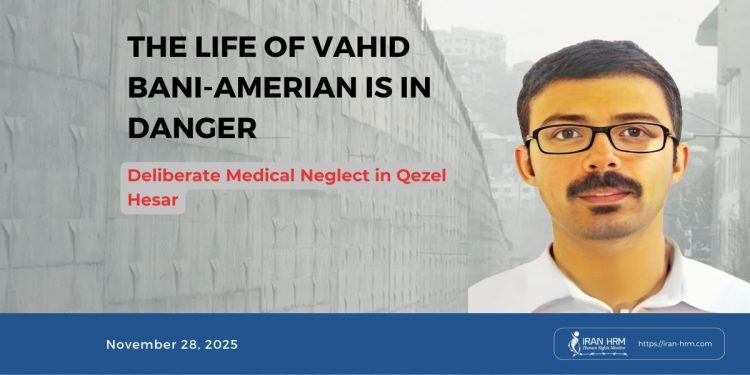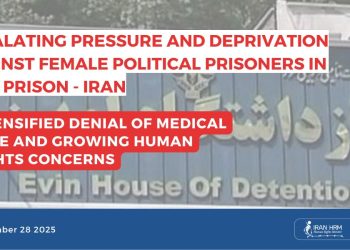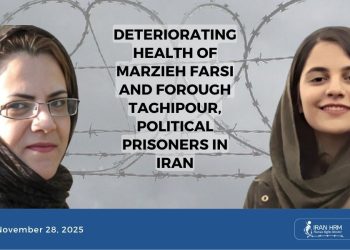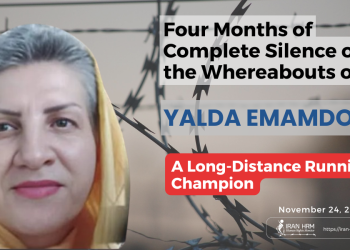Vahid Bani-Amerian, a political prisoner and supporter of the People’s Mojahedin Organization of Iran (PMOI), who is held under a death sentence in Qezel Hesar Prison, was once again returned to the prison without receiving essential medical care. This marks the fourth instance in two months in which he has been transferred to a hospital and brought back without examination, pushing his physical condition to a critical point and heightening concerns about an imminent risk to his life. Multiple reports from inside the prison indicate that severe visual impairment, gastrointestinal complications, immune system weakness, and persistent headaches—stemming from previous beatings—have left him in a fragile and dangerous state. While his conditions require urgent and continuous specialist treatment, the security apparatus has intentionally blocked his access to medical care, placing him at serious risk. Because of the torture he has endured, the unfair judicial process, and the issuance of a death sentence, his case has drawn international attention, including from Amnesty International and the UN Special Rapporteur.
Factual Account
According to credible information, on Wednesday, 26 November 2025 (5 Azar 1404), Vahid Bani-Amerian was transferred to a hospital for an endoscopy and an eye examination. However, due to a lack of coordination between the prison and the medical staff, no physician was present, and he was returned to Qezel Hesar without any examination. Over the past two months, this marks the fourth such transfer with no medical outcome. This pattern of failed medical referrals persists despite his worsening conditions: severe gastrointestinal issues, respiratory infections, immune system weakness, and a sharp decline in vision. His visual deterioration worsened after he was beaten during transfer from Fashafuyeh Prison to Qezel Hesar, during which his eyeglasses were broken and have never been replaced. According to those close to him, this situation has caused persistent headaches and increasingly impaired daily functioning, reducing his ability to withstand harsh prison conditions.
Case Background
Born in 1992 in Songhor, Vahid Bani-Amerian is a political prisoner and supporter of the PMOI. He holds a master’s degree in management from K. N. Toosi University of Technology.
He was arrested on 22 December 2023 (1 Dey 1402) and transferred to Ward 209 of Evin Prison, where he was subjected to severe torture and interrogations. The torture was so intense that upon his transfer to the public ward of Evin, prison authorities forced him to sign a statement claiming the torture had occurred before his arrival in the ward. In October 2024 (Mehr 1403), his trial was held jointly with five other political prisoners—Seyed Mohammad Taghavi, Babak Alipour, Pouya Ghobadi, Shahrokh Daneshvarkar, and Abolhassan Montazer— “…at Branch 26 of the Revolutionary Court in Tehran, presided over by Judge Iman Afshari.
On 7 October 2024 (15 Mehr 1403), his trial was held jointly with Seyed Mohammad Taghavi, Babak Alipour, Pouya Ghobadi, Shahrokh Daneshvarkar, and Abolhassan Montazer.
On 30 November 2024 (10 Azar 1403), the court sentenced Vahid Bani-Amerian and the others to death on the charge of baghi (“armed rebellion”), a charge international human rights bodies consider illegitimate and based on coerced confessions.”Bani-Amerian had been previously arrested in 2017, 2018, and 2020. In one case, he received a five-year sentence for “propaganda against the state and insulting the leader.” In 2020 he was sentenced to ten years in prison and two years of exile on multiple security-related charges.
Medical Deprivation as a Form of White Torture
The deliberate denial of medical care is a well-documented method of white torture in which physical and psychological pressure is applied without leaving visible marks. In Bani-Amerian’s case, the pattern of deliberate harm is unmistakable: repeated transfers without examination, the absence of medical specialists, refusal to provide eyeglasses, and persistent neglect of progressive health conditions. These actions follow a systematic approach aimed at breaking the prisoner’s resistance by weakening his body and intensifying his suffering. Preventing examinations, ignoring chronic illnesses, and returning him to confinement with a deteriorating condition mirror established patterns of white torture in Iranian prisons.
International Alerts and Reactions
Bani-Amerian’s case has drawn significant international attention. Amnesty International issued an official statement warning about the situation of six political prisoners sentenced to death—including him—and described their proceedings as “grossly unfair” and “politically motivated.” By publishing their identities and photographs, Amnesty stressed that the arrests, coerced confessions, and resulting death sentences lack legal legitimacy and must be immediately overturned.
Mai Sato, the UN Special Rapporteur on the situation of human rights in Iran, also issued an official communication to the Iranian authorities expressing grave concern about the imminent risk of execution for these six political prisoners. She highlighted serious violations including torture for coerced confessions, prolonged solitary confinement, denial of medical care, and the absence of fair trial guarantees. Sato emphasized that imposing the death penalty for baghi is incompatible with Article 6 of the International Covenant on Civil and Political Rights (ICCPR), which restricts capital punishment exclusively to the “most serious crimes,” meaning intentional killing. She urged Iranian authorities to halt the executions immediately and to implement a moratorium as a step toward full abolition of the death penalty.
Legal Analysis
From the standpoint of international law, Bani-Amerian’s case embodies multiple severe violations. The deliberate denial of medical care violates Article 5 of the Universal Declaration of Human Rights (UDHR), which prohibits torture and cruel, inhuman, or degrading treatment. Furthermore, under Article 25 of the UDHR, every individual has the right to health and medical care—a right systematically denied to him. Article 10 of the ICCPR requires that all individuals deprived of liberty be treated humanely, and the refusal to provide necessary medical treatment directly violates this obligation. Additionally, sentencing him to death for baghi contradicts Article 6 of the ICCPR, which strictly limits the death penalty to cases of intentional homicide. The treatment of Bani-Amerian—from arrest to sentencing and ongoing detention—demonstrates a sustained pattern of violations against political prisoners in Iran.
Conclusion
Given his deteriorating physical condition, continued denial of medical care, and the risks inherent in his death sentence, Bani-Amerian’s case has entered a dangerously critical stage. The repeated returns without treatment over the past two months show a deliberate strategy to exert further pressure on him. In this context, the calls by international human rights bodies for immediate intervention, cessation of medical neglect, and halting of any execution plans are more urgent than ever. His case stands as a serious warning about the continued use of medical deprivation and white torture against political prisoners in Iran.







